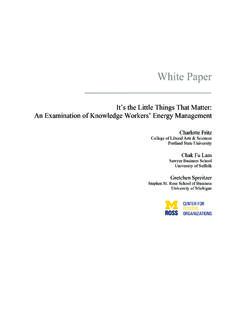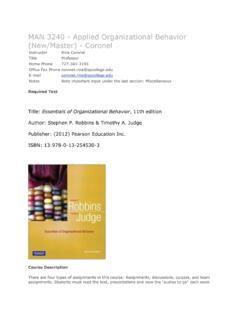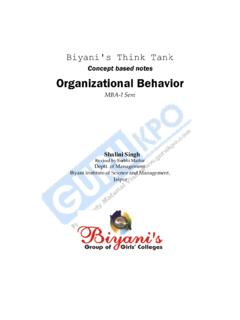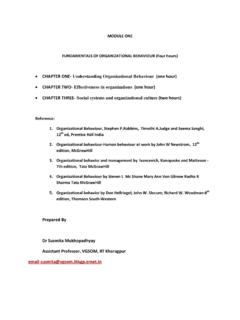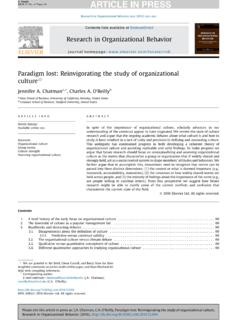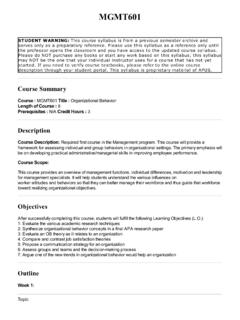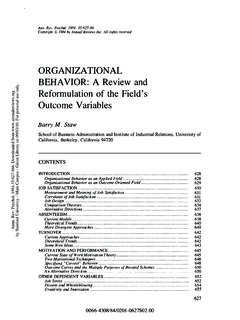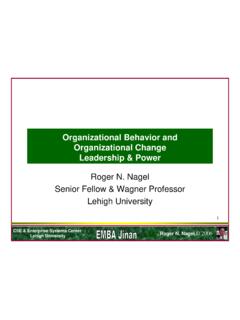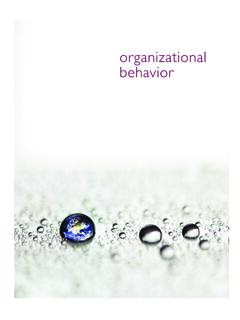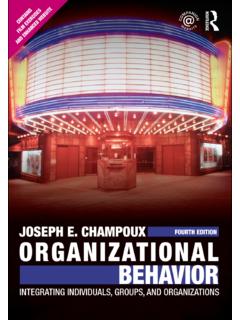Transcription of RESEARCH IN ORGANIZATIONAL BEHAVIOR DOCTORAL …
1 1 RESEARCH IN ORGANIZATIONAL BEHAVIOR DOCTORAL SEMINAR BUSADMIN 996 UNIVERSITY OF WISCONSIN-MILWAUKEE SPRING 2011 Professor: Dr. Belle Rose Ragins Office: Lubar Hall S357 Phone: Home Office: 332-5134 (best place to reach me) School Office: 229-6823 E-Mail: Class: Thursday 9:30-12:10 LUB S341 Office Hours: Thursdays: 12:15 1:15 & by appointment COURSE OVERVIEW AND PERSPECTIVE This course offers an introduction to established and emerging trends, theory and RESEARCH in the field of ORGANIZATIONAL BEHAVIOR . Traditionally, the field has taken a relatively narrow perspective in examining the behaviors of individuals in organizations. However, contemporary perspectives have widened this lens to offer a more complete and thorough understanding of the role of individuals in ORGANIZATIONAL life and the effects of context in these relationships. In particular, current perspectives seek to explore, understand and articulate the behaviors, thoughts and emotions of individuals within the context of work relationships, teams, ORGANIZATIONAL and community settings.
2 In essence, while the focus is still on the individual, the field acknowledges the embedded nature of ORGANIZATIONAL BEHAVIOR . Individuals are nested within relationships and groups, and these relationships exist within and outside ORGANIZATIONAL boundaries. Moreover, organizations, communities, and groups are composed of individuals and their work relationships. In fact, organizations do not exist without individuals and the relationships developed by individuals are the means by which work is done and meaning is found in organizations. Accordingly, you will be asked to integrate across levels of analysis in order to understand how the behaviors, thoughts and emotions of individuals influence and are influenced by ORGANIZATIONAL context. There is a strong liklihood that you have already had significant course work in macro perspectives. In this course, you will need to 2 develop a complementary understanding of micro psychological theories of human BEHAVIOR in order to understand the mechanisms driving human BEHAVIOR within ORGANIZATIONAL contexts.
3 This course will take a unique holistic approach that examines not only the interface between the individual and the organization, but also the effects of non-work factors on work attitudes, emotions and behaviors. For example, societal relationships among dominant and non-dominant groups affect the power, perceptions and stereotypes individuals bring to the workplace, as well as their workplace interactions, behaviors and relationships. Individuals do not leave their identities and experiences at the workplace door, but carry these experiences with them into their work environment. We know that life and work domains interact in complex, and yet to be fully articulated ways. For example, scholars are just beginning to assess the reciprocal relationship between work and life ( , home/community/life experiences) domains. Therefore, in this course you will be challenged to move beyond traditional perspectives. We will work together to develop integrative frameworks that explain individual behaviors, cognitions and emotions as embedded phenomenon nested within ORGANIZATIONAL , community and societal contexts.
4 I know you are ready for this exciting intellectual adventure! So here are the particulars. COURSE OBJECTIVES 1. To offer you an introduction to the core theories, concepts and RESEARCH in the field of ORGANIZATIONAL BEHAVIOR . 2. To provide an opportunity for you to engage in reflective dialogue that deepens your analytical skills and enriches your understanding of the theoretical frameworks, challenges and dilemmas facing the field. 3. To sharpen your skills as a developmental reviewer and prepare you for future RESEARCH collaborations. 4. To identify exciting new areas of scholarship and to give you a head start on publishing in the field. REQUIREMENTS AND GRADING PLAN 25% Discussion Leadership and Class Participation 20% Weekly Reaction Papers 5% Peer Reviewing 30% RESEARCH Paper 5% Symposium Presentation 15% Take Home Exam ___ 100 points 3 Failing to complete one or more of the above requirements will result in a failing grade for the course.
5 Grade Allocation: A: 93-100 points; A-: 90-92; B+: 87-89; B: 83-86; B-: 80-82; C+: 77-79; C: 73-76; C-; 70-72; D+: 67-69; D: 63-66; D-: 60-62; F: below 59. With the exception of the final exam and the paper, all activities will be evaluated with a three-level system involving check (good job: full points), check plus (extraordinary: extra points) and check minus (marginal or inadequate: fewer points). It is anticipated that most evaluations will result in a check and relatively few will result in the other two categories. EXPECTATIONS FOR CREATING AN EFFECTIVE LEARNING LAB As with any DOCTORAL seminar, you need to attend class regularly (and promptly), read the articles, and be prepared to discuss the articles in class. That s just the foundation. Our goal is to transform the classroom into a learning lab through interaction, engagement and participation. Participation reflects not only the presentation of your own ideas and insights, but also the degree to which you listen and thoughtfully build on your colleague s comments and ideas.
6 Moreover, a key goal of this course is to generate future RESEARCH collaborations among the colleagues in the class, so offering ideas in a constructive, respectful and helpful way is critical towards creating a thriving intellectual climate within and outside of the classroom. Effective class participation may include offering new and unique insights, clarifying issues and complexities, reframing and extending ideas in meaningful ways, and offering a perspective that helps the group integrate and synthesize readings, ideas, and topics. Debate and dialogue are part of the process, but always within the realm of respect and appreciation for the thoughts and feelings of others. In order to create a true learning laboratory, we need to engage in processes involving mutual learning and discovery. There are no stupid questions (or answers). Every idea has merit and the capacity to create something bigger. DISCUSSION LEADERS Class members will engage in the role of discussion leader for two class sessions.
7 Please e-mail me your top four preferences by 5 pm the day before the second class. I will do my best to accommodate your request. Discussion leaders will begin leading sessions the third week of class ( , session on identity). Depending on class size, discussion leaders may not be assigned for the session on mentoring. 4 Responsibilities of Discussion Leaders. The discussion leader is responsible for developing a creative class structure that engages class members while facilitating learning and the creation of new insights into the literature. There are three key elements to this role. First, you are responsible for getting the group to engage in a critically constructive dialogue of the issues, challenges and dilemmas raised in the readings. Be creative in designing a session that will stimulate dialogue, interactions and perhaps the creation of knowledge. You can start with an exercise or a set of questions designed to spark discussion and debate.
8 You may want to have the group craft integrative models or identify key gaps in the literature. For some topics, you might want to have your colleagues engage in a debate by randomly assigning members to pro or con sides of an issue. You may want to present a concept map that depicts relationships among the focal constructs, or you may choose to have group members develop maps individually or collectively. It is critical that you not only have an absolutely firm grasp of the readings that week, but also that you have given significant thought to the type of questions that engender integration, debate and dialogue. Some ideas include an assessment of the similarities and differences in the approaches, assumptions, methods and conclusions of the articles. How do the articles build upon one another? What puzzles or complexities do they raise? What should be the next steps in RESEARCH in this area? It s always a nice idea to try to ask questions that you don t know the answer to; this encourages mutual discovery rather than a guess what I m thinking approach.
9 Second, it is critical that you thoroughly read and integrate the thought papers from your class colleagues. This will spark new ideas and insights into where the class is, and where they can/should go. Recall that you are not required to write a thought paper on the day that you serve as a discussant leader. In essence, you are called on to develop a meta thought analysis that integrates the analyses and ideas offered by your colleagues in the class. This is not a summary of the ideas presented by your colleagues; rather it is a thoughtful reflection and synthesis of the ideas, challenges, issues, and conundrums identified by the group. This meta-analysis will not be turned in, but will be instrumental in guiding your discussion and approach to the class; in order to facilitate effective dialogue you need to understand your colleague s views, questions and ideas. The third requirement for discussion leaders is that they need to help the group make cross-topic connections between readings of the current session and past sessions.
10 You could offer this connection to the group, or have this be an exercise conducted in the later part of the class. This integration across topics is critical for us to see the big picture of how different topic areas connect. Are there unifying frameworks that can help us integrate across topics? Perhaps we can diagram or model these relationships? What are the challenges with integrating across topics? What are the connecting points? What RESEARCH needs to be conducted that integrates not only within, but also across the topics covered in this class? This can be a very creative and exciting portion of the class. 5 Facilitating discussion and dialogue is a skill; it s easy to lecture but often difficult to facilitate engagement and dialogue in a class. Each of us has a different level of this skill, but we all need to develop this skill as it is central for effective teaching. So, at the end of each session, we ll spend a bit of time reflecting on the strategies and techniques that were most effective for facilitating dialogue.
